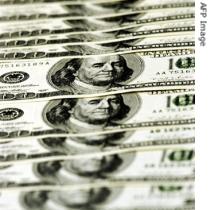2007年VOA标准英语-US Dollar Seen as Weak, Declining Further
时间:2019-01-06 作者:英语课 分类:2007年VOA标准英语(七月)
Washington
18 July 2007
The House of Representatives Financial Services Committee Tuesday heard from economists 1 who agreed the weakening dollar is likely to decline further. VOA's Barry Wood reports.

Committee member Ron Paul, a conservative Republican, called attention to the dollar's weakness. The U.S. currency, he said, has this year lost nine percent against the euro and even more against some other currencies.
"It's lost more than 10 percent against the British pound," he said. "And lo and behold 3, the Indian rupee - if you had been holding Indian rupees - you would have made 13 percent."
Paul asked the panel of three economists whether Americans should be worried by the dollar's decline. Alan Meltzer, a professor at Carnegie Mellon University in Pittsburgh, said the dollar is weak because for America's rising external deficit 4.
"The long-term problem is a serious one," he said. "If you ask, over the long-term what is likely to happen to the dollar, you'd have to believe that over the long-term the dollar is going to decline in value. Why is that? Basically, because we invest more [as a nation] than we save. We save too little."
Benjamin Friedman from Harvard said no other country could get away with having such large current account (trade) deficits 5. It is, he said, irresponsible for the United States to incur 6 an external deficit equal to 6.5 percent of its national income.
But none of the economists saw a danger in the huge accumulation of dollars by China and Japan. Neither country, they said, would gain by selling their dollar holdings in order to devaluate the currency further.
Jamie Galbraith, the son of the late Nobel-winning economist 2 John Kenneth Galbraith, is a professor at the University of Texas.
"The problem, as I see it, is that the system - like all monetary 7 systems - is inherently precarious," he said. "It is subject to a shock, a crisis, a panic, a collapse 8 down the road."
None of the economists would predict how much further the dollar will drop. But they said a further decline could help by lowering the prices of U.S. exports, thereby 9 boosting exports and reducing the size of the external deficit.
- The sudden rise in share prices has confounded economists. 股价的突然上涨使经济学家大惑不解。
- Foreign bankers and economists cautiously welcomed the minister's initiative. 外国银行家和经济学家对部长的倡议反应谨慎。 来自《简明英汉词典》
- He cast a professional economist's eyes on the problem.他以经济学行家的眼光审视这个问题。
- He's an economist who thinks he knows all the answers.他是个经济学家,自以为什么都懂。
- The industry of these little ants is wonderful to behold.这些小蚂蚁辛勤劳动的样子看上去真令人惊叹。
- The sunrise at the seaside was quite a sight to behold.海滨日出真是个奇景。
- The directors have reported a deficit of 2.5 million dollars.董事们报告赤字为250万美元。
- We have a great deficit this year.我们今年有很大亏损。
- The Ministry of Finance consistently overestimated its budget deficits. 财政部一贯高估预算赤字。 来自《简明英汉词典》
- Many of the world's farmers are also incurring economic deficits. 世界上许多农民还在遭受经济上的亏损。 来自辞典例句
- Any costs that you incur will be reimbursed in full.你的所有花费都将全额付还。
- An enterprise has to incur certain costs and expenses in order to stay in business.一个企业为了维持营业,就不得不承担一定的费用和开支。
- The monetary system of some countries used to be based on gold.过去有些国家的货币制度是金本位制的。
- Education in the wilderness is not a matter of monetary means.荒凉地区的教育不是钱财问题。
- The country's economy is on the verge of collapse.国家的经济已到了崩溃的边缘。
- The engineer made a complete diagnosis of the bridge's collapse.工程师对桥的倒塌做了一次彻底的调查分析。